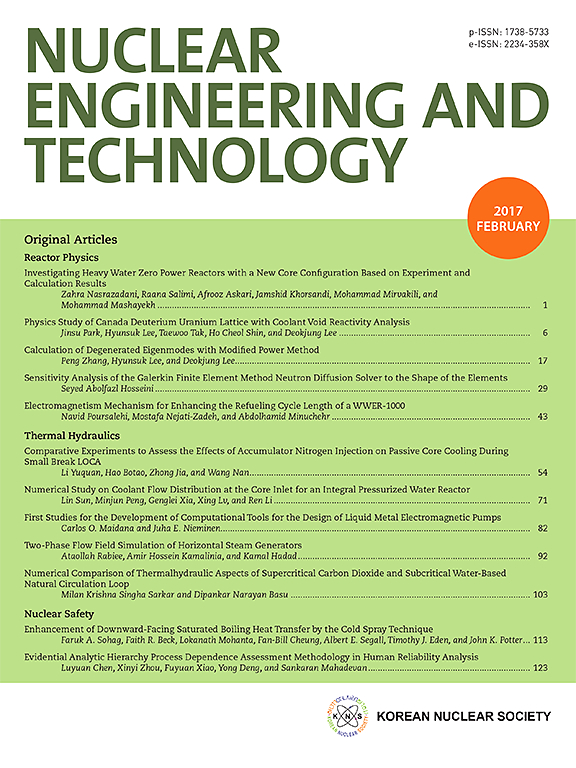工业设施运行风险模型,包括老化/测试退化效应和维护效果
IF 2.6
3区 工程技术
Q1 NUCLEAR SCIENCE & TECHNOLOGY
引用次数: 0
摘要
本文介绍了一种应用于核电站和铀矿开采的工业设施运行风险模型。传统模型针对特定运行条件更新风险概况,将已知因故障或维护而不可用的部件的故障概率设为 1,而其余部件则保持原始概率安全分析(PSA)中的平均不可用性恒定值。建议的方法通过瞬时不可用性模型考虑了备用故障概率的时间依赖性,这取决于每个组件在给定时刻的具体备用时间,而不是使用相同的恒定值。该方法还纳入了传统模型中未明确考虑的老化、测试退化效应和维护效果,以及对常见故障概率的瞬时重新评估。结果表明,如果不考虑组件的特定待机时间、老化、测试退化效应和维护效果,则会大大低估风险。本文章由计算机程序翻译,如有差异,请以英文原文为准。
A model for operational risk of industrial facilities including ageing/test degradation effects and maintenance effectiveness
The paper presents a model for operational risk of industrial facilities with applications to nuclear power plants and uranium mining. The traditional models update the risk profile for specific operational conditions setting to one the failure probability of components which are known to be unavailable by failure or maintenance, while constant mean unavailability values from the original Probabilistic Safety Analysis (PSA) are kept for the rest. The proposed methodology considers the time dependency of standby failure probabilities through instantaneous unavailability models, depending on the specific standby time for each component at the given moment, instead of using the same constant values. It also incorporates ageing, testing degradation effects and maintenance effectiveness, not explicitly considered in traditional models, as well as the instantaneous reevaluation of common cause failure probabilities. The results show significant risk underestimations when components specific standby times, ageing, testing degradation effects and maintenance effectiveness are not considered.
求助全文
通过发布文献求助,成功后即可免费获取论文全文。
去求助
来源期刊

Nuclear Engineering and Technology
工程技术-核科学技术
CiteScore
4.80
自引率
7.40%
发文量
431
审稿时长
3.5 months
期刊介绍:
Nuclear Engineering and Technology (NET), an international journal of the Korean Nuclear Society (KNS), publishes peer-reviewed papers on original research, ideas and developments in all areas of the field of nuclear science and technology. NET bimonthly publishes original articles, reviews, and technical notes. The journal is listed in the Science Citation Index Expanded (SCIE) of Thomson Reuters.
NET covers all fields for peaceful utilization of nuclear energy and radiation as follows:
1) Reactor Physics
2) Thermal Hydraulics
3) Nuclear Safety
4) Nuclear I&C
5) Nuclear Physics, Fusion, and Laser Technology
6) Nuclear Fuel Cycle and Radioactive Waste Management
7) Nuclear Fuel and Reactor Materials
8) Radiation Application
9) Radiation Protection
10) Nuclear Structural Analysis and Plant Management & Maintenance
11) Nuclear Policy, Economics, and Human Resource Development
 求助内容:
求助内容: 应助结果提醒方式:
应助结果提醒方式:


